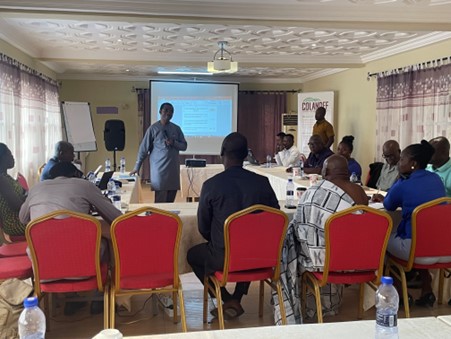The Lands Commission, in collaboration with its stakeholders, will by close of this year complete work on a Legislative Instrument (L.I.) that will define the processes for implementing the 2020 Land Act, Maxwell Adu-Nsafoa, Technical Director-Lands, Ministry of Lands and Natural Resources, and Head-Operations, Lands Commission, has disclosed.
He said this in an interview with media on the side-lines of a stakeholder consultative session aimed at gathering input toward drafting the L.I. for Land Act 2020 (Act 1036).
According to Mr. Adu-Nsafoa, a draft regulation has been submitted to the Lands Commission for review; and further engagements with stakeholders will be done before submitting it to parliament for approval.
“We have a draft regulation submitted by the consultant to the Lands Commission, and the Lands Commission is currently reviewing the draft – after which we will engage stakeholders on the various aspects to come out with the final draft that will be submitted to parliament for consideration. We have this year to complete it,” he said.
He stressed the relevance of such stakeholder engagements to preparation of the document as well as to the land administration.
“The Land Act came into force in December 2020 and the regulations are to outline the process by which it is going to be implemented; so even though it has been out since 2020, we are now working on the regulations – and the regulations will need the input of all stakeholders in the land sector. That is why today we are meeting the farmers to get their input to be submitted to the Lands Commission for the preparation.
“We want their input regarding some of the issues affecting their interest in land. Some of them are tenant farmers while others are lease holders, so we want to know what the regulation should dictate as far as their interest in land is concerned,” he added.
Parliament passed the Land bill, 2019 – a formal legal regime to guide and regulate land acquisition and usage in the country on Thursday July 23, 2020. It aims to consolidate reforms made so far in Ghana’s land sector following implementation of the National Land Policy (NLP) in 1999.
The consultative session with selected farmer cooperatives and traditional leaders was organised by the Coordinating Committee of the Land Sector Multi-Stakeholder Platform (LSMP), with support from Trust Africa and COLANDEF.
Nana Ama Yirrah, Executive Director-COLANDEF, said the session is one of many commitments by partner institutions to deepen stakeholder participation in the L.I.’s drafting.
“In 2020, Ghana had the new Land Act passed – and this new land act is designed to address many of the land sector challenges we have today.
“The Lands Commission is spearheading the development of regulations for the Land Act; and as part of the Land Conference held in 2022, we agreed that whatever is done will be done with the participation of stakeholders. The idea is to bring them together as stakeholders of the Trust Africa project to have them give their comments, inputs and recommendations toward the regulations.
“We have gathered some quite interesting perspectives from them, which we are hoping – together with the Lands Commission and resource persons leading the regulations – we will be able to get some useful inputs from to shape the regulations for the Land Act,” she noted.
Part of the challenges the new law seeks to resolve, she indicated, includes clarifying the different types of rights and interests in land.
“One of the benefits is that the Act has clarified the different types of interests we can have in land; and for some of us who are technical persons, we think this is so important. When we talk about land ownership, for us in Ghana, our vocabulary does not give us the opportunity to unpack what ownership is about.
“So, the Land Act has differentiated all the different types of interests and rights over land; that is, if I say it is mine, it is clear what type of ownership I am describing. So, we need to educate ourselves on these different types of rights and interests; and we need to pursue the effort of documenting these different types of rights and interests.
“The other thing that the new Land Act also brings is the fact we have decentralised the land documentation system. Many of us acquire land in traditional areas and usually do documentation or registration with the Land Commission; but now, the Land Act has made it legal to have customary land secretariats in every traditional area – so that when you acquire a parcel of land, you can go and get your land rights documented and recorded. This serves as evidence of your transaction at that level,” she intimated.
The event provided a platform for the farmer cooperatives and traditional leaders to review relevant sections of the Land Act, and its implications for customary land administration and land tenure.
The resource persons explained relevant sections of the Act to participants, made up of representatives from cooperatives in the oil palm and cocoa sectors working as farmers in different traditional areas of five regions.










